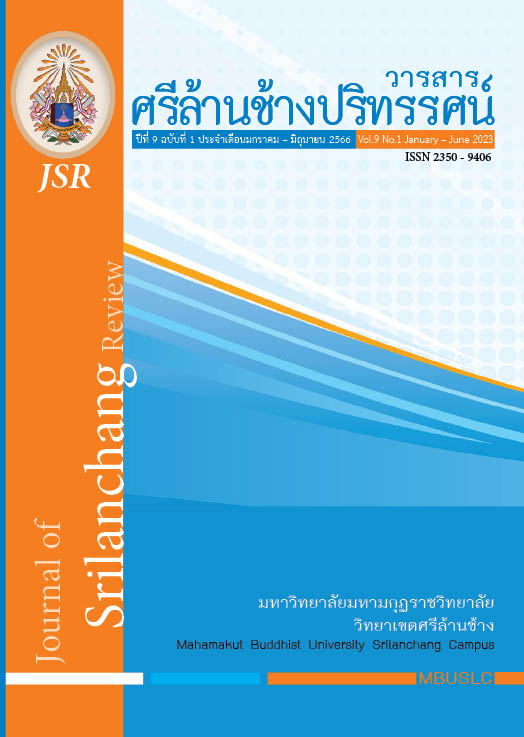A STUDY OF USING THE MINDFULNESS TO ACCORDING TO CITTANUPASANASATIPASTHANA OF THE MEDITATION PRACTITIONERS OF WILL – POWER INSTITUTE IN LOEI DISTRICT, LOEI PROVINCE
Main Article Content
Abstract
The objectives of this research were: (1) to study the teaching and learning of the meditation teacher curriculum of the Willpower Institute; (2) to study the use of mindfulness according to the principle of Cittānupassanā-Satipaṭṭhāna of practitioners in the Willpower Institute; (3) to propose guidelines for the use of mindfulness according to the principle of Cittānupassanā-Satipaṭṭhāna of practitioners in the Willpower Institute. This study was carried out by means of mixed-method research. The samples included 414 practitioners in the Willpower Institute in Muang District, Loei Province, and 20 key informants were interviewed.
The research results were as follows:
1) The current state of the teaching and learning of the meditation teacher curriculum of the Willpower Institute in Muang District, Loei Province, has the following results: (1) principles of the curriculum; (2) objectives of the curriculum: (3) target group; (4) content of learning; (5) teaching techniques; (6) learning media; (7) measurement and evaluation.
2) The use of mindfulness according to the principle of Cittānupassanā-Satipaṭṭhāna of practitioners in the Institute of Willpower: the overall score was statistically rated at a high level (X̅ = 4.15, S.D. = 0.56). Sorted by descending, the highest score was seen in the aspect of society (X̅ = 4.25, S.D. = 0.49), followed by work ( X̅ = 4.15, S.D. = 0.51) and personal life (X̅ = 4.05, S.D. = 0.55).
3) The guidelines for using mindfulness according to the principle of Cittānupassanā-Satipaṭṭhāna of practitioners in the Willpower Institute were as follows: (1) working aspect including building unity in the organization, being responsible for the tasks assigned, organizing charity activities and Dhamma activities regularly; (2) social aspect including to provide good service to society, to help other people, to have good human relations with people in the community; (3) the aspect of personal life, including listening to the opinions of family members, trusting to be expected in various matters and living according to the principle of sufficiency economy.
Article Details

This work is licensed under a Creative Commons Attribution-NonCommercial-NoDerivatives 4.0 International License.
บทความที่ได้รับการพิจารณาจากคณะกรรมการผู้ทรงคุณวุฒิและเผยแผ่ในวารสารฉบับนี้ เป็นทัศนคติและข้อคิดเห็นส่วนบุคคลของผู้เขียนแต่ละท่าน ไม่ถือว่าเป็นทัศนะคติและความรับผิดชอบ
ของบรรณาธิการ
บทความ ข้อมูล เนื้อหา รูปภาพ ฯลฯ ที่ได้รับการตีพิมพ์ในวารสารศรีล้านช้างปริทรรศน์ ถือเป็นลิขสิทธิ์ของวารสารศรีล้านช้างปริทรรศน์ หากบุคคลหรือหน่วยงานใดต้องการนำทั้งหมดหรือส่วนหนึ่งส่วนใดไปเผยแพร่ต่อหรือเพื่อกระทำการใด ๆ จะต้องได้รับอนุญาตเป็นลายลักอักษรจากวารสารศรีล้านช้างปริทรรศน์ ก่อนเท่านั้น
References
คณาจารย์มหาวิทยาลัยมหาจุฬาลงกรณราชวิทยาลัย. (2563). ธรรมะภาคปฏิบัติ 1. พระนครศรีอยุธยา: สำนักพิมพ์มหาวิทยาลัยมหาจุฬาลงกรณราชวิทยาลัย.
ณฐเมศร์ วงศ์ศุภาพัฒน์. (2555). แนวทางในการประยุกต์ใช้สติและสัมปชัญญาเพื่อเพิ่มประสิทธิภาพในการแก้ไขปัญหาของพนักงานต้อนรับบนเครื่องบิน บริษัทการบินไทย. วิทยานิพนธ์พุทธศาสตรมหาบัณฑิต. บัณฑิตวิทยาลัย: มหาวิทยาลัยมหาจุฬาลงกรณราชวิทยาลัย.
พระเจริญ อคฺควิริโย (เกษม วิริยะเลิศ). (2554). ศึกษาการรับรู้สติปัฎฐาน 4 ของอุบาสก-อุบาสิกา วัดพิชยญาติการาม กรุงเทพมหานคร. วิทยานิพนธ์ปริญญาพุทธศาสตรมหาบัณฑิต. บัณฑิตวิทยาลัย: มหาวิทยาลัยมหาจุฬาลงกรณราชวิทยาลัย.
พระชาตรี ฐิตเมโธ(วงษ์สกิจ). (2554). ผลสัมฤทธิ์ทางการปฏิบัติวิปัสสนากัมมัฏฐานตามแนวทางศูนย์ปฏิบัติวิปัสสนากัมมัฏฐานภาคเหนือ วัดร่าเปิง(ตโปทาราม). วิทยานิพนธ์ปริญญาพุทธศาสตรมหาบัณฑิต. บัณฑิตวิทยาลัย: มหาวิทยาลัยมหาจุฬาลงกรณราชวิทยาลัย.
พระเสริมพร แก้วมะ. (2561). ผลของการปฏิบัติสมาธิที่มีต่อบทบาทภาวะผู้นำกรณีศึกษา: ผู้เรียนหลักสูตรครูสมาธิ สถาบันพลังจิตตานุภาพ. วิทยานิพนธ์ปริญญาศิลปศาสตรมหาบัณฑิต (สาขาวิชาผู้นำทางสังคม ธุรกิจ และการเมือง). บัณฑิตวิทยาลัย: มหาวิทยาลัยรังสิต.
มาลีวัล เลิศสาครศิริ. ประสิทธิผลของโปรแกรมการฝึกสมาธิต่อพหุปัญญาของนักศึกษาชั้นปีที่ 1 วิทยาลัยเซนต์หลุยส์. วารสารพยาบาลทหารบก, 17(3) (กันยายน - ธันวาคม 2559), หน้า 43 - 53.
ว่าที่ร้อยตรีหญิงสุทธญาณ์ โอบอ้อม. (2558). การพัฒนาศักยภาพองค์กรปกครองส่วนท้องถิ่นตามแนวพระพุทธศาสนา. วิทยานิพนธ์ปริญญาพุทธศาสตรดุษฎีบัณฑิต. บัณฑิตวิทยาลัย: มหาวิทยาลัยมหาจุฬาลงกรณราชวิทยาลัย.
สุคนธ์ มาพัวะ. (2556). การนำหลักสติไปใช้เพื่อแก้ปัญหาการทำงานพนักงานการไฟฟ้าฝ่ายผลิตแห่งประเทศไทย. วิทยานิพนธ์ปริญญาพุทธศาสตรมหาบัณฑิต. บัณฑิตวิทยาลัย: มหาวิทยาลัยมหาจุฬาลงกรณราชวิทยาลัย.


